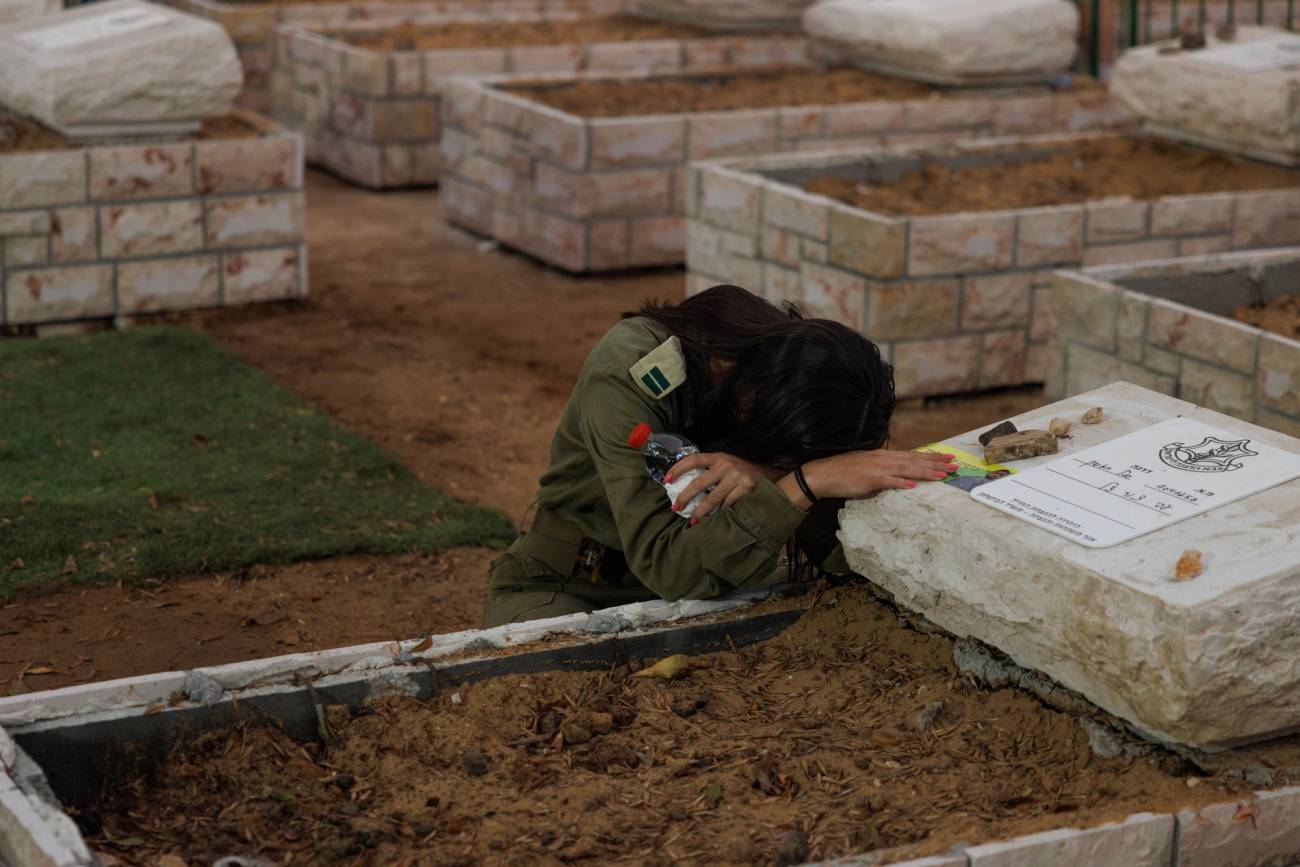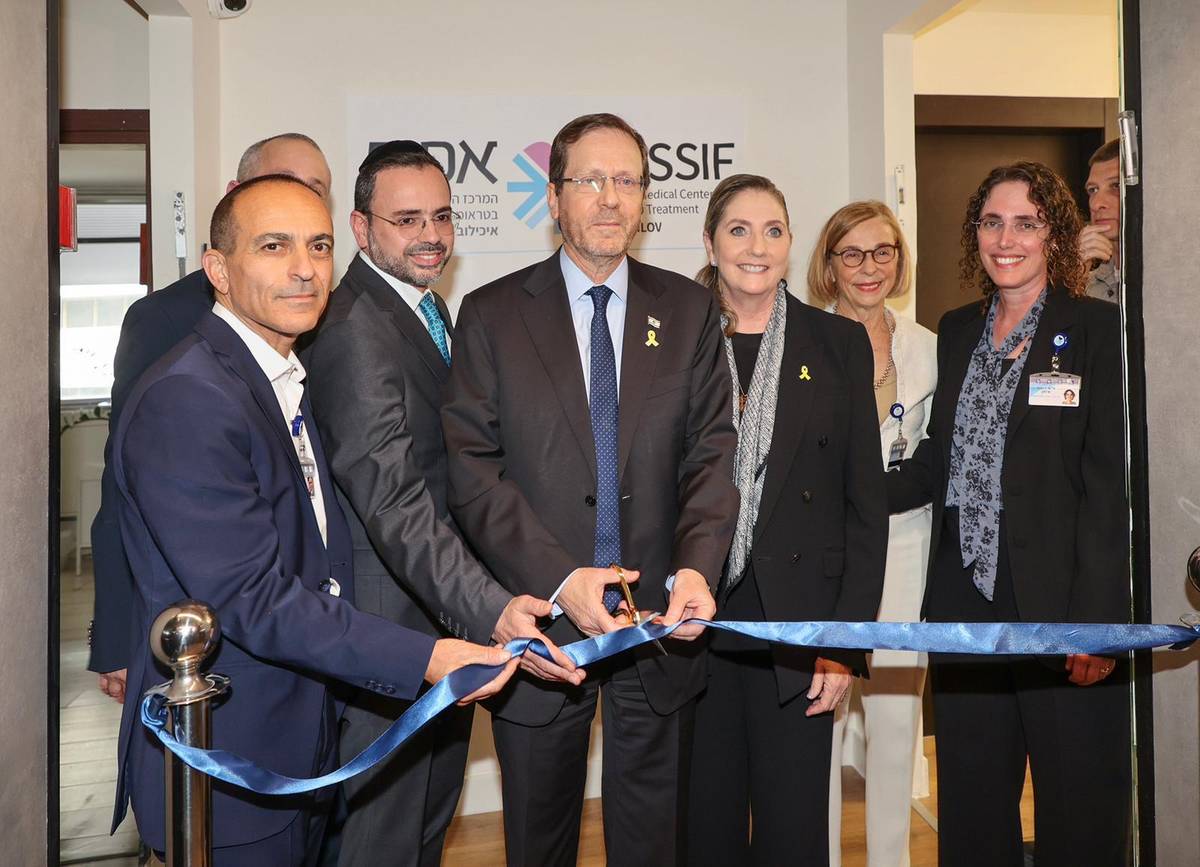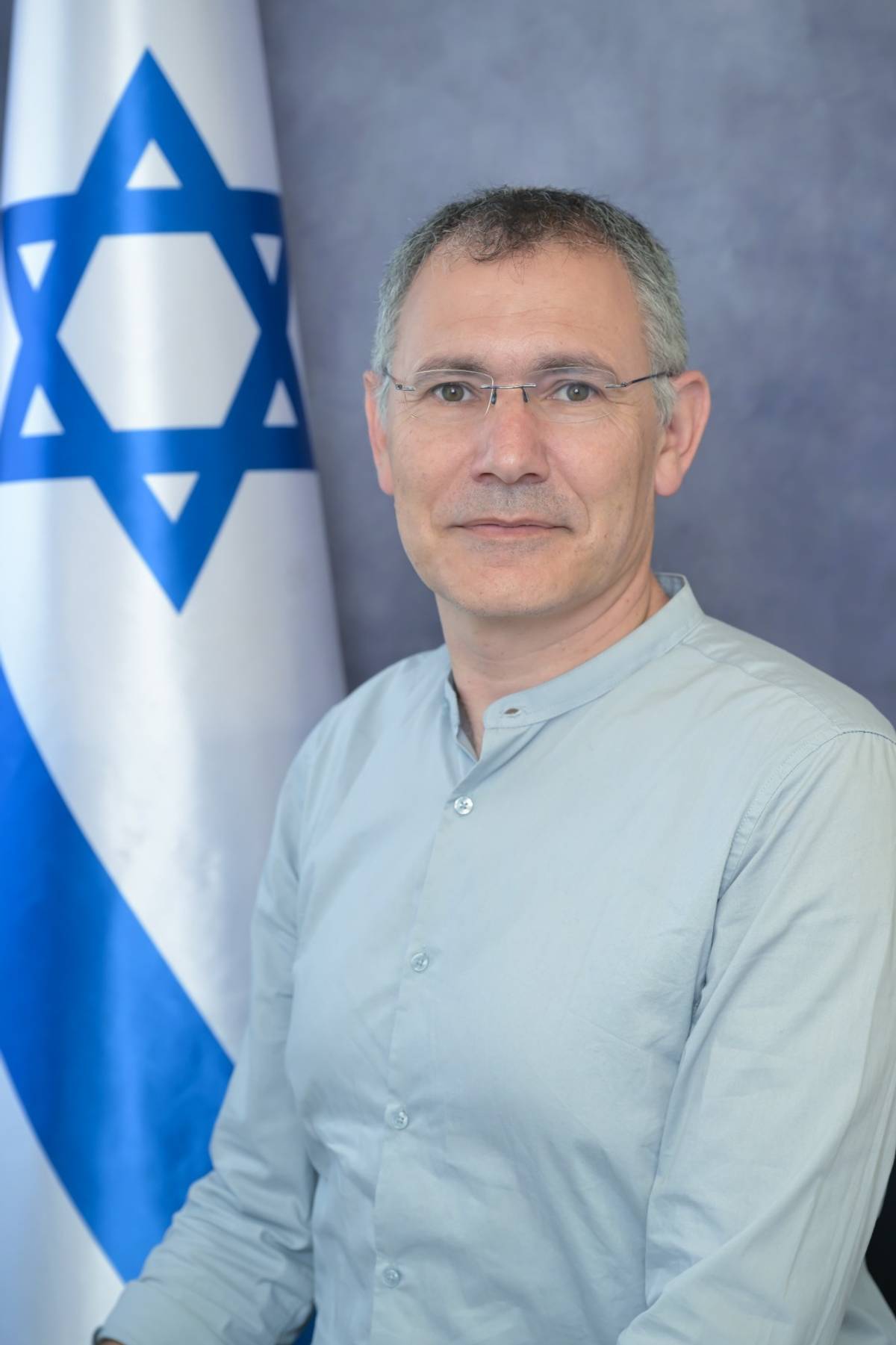The question I asked Mor Peretz to open our recent phone interview was a standard ice-breaker: “Where do you live?”
Her response was jarring: “Now, I’m not living.”
That’s because, Peretz explained, “after what happened”—surviving Hamas’ Oct. 7 murder of 360 people at the Nova music festival, where she helped run a food stand—she couldn’t function in her job working for a clothing designer and went on unpaid leave. That led to Peretz losing her apartment in Netanya and moving in with a friend.
Little by little, Peretz is recovering, including through weekly therapy sessions with a psychologist at the Lev Hasharon Mental Health Center, near Netanya.
“She gives me homework, and I do it because I want to help myself,” Peretz said.
Peretz, 54, is hardly alone as an Israeli dealing with emotional challenges related to the Oct. 7 massacre, when Hamas terrorists invaded the western Negev, murdered 1,200 people throughout the region, and kidnapped 250 more.
It’s trauma upon trauma, hardship upon hardship.
“We are facing a mental health tsunami because there’s such a big increase in mental health needs, and the Israeli mental health system was neglected for so many years,” said Inbal Brenner, a psychiatrist at Lev Hasharon.
In the month following the attacks, Israel’s leading health maintenance organizations (HMOs) reported record levels of requests by patients for sleeping pills, painkillers, and tranquilizers.
On March 6, Tel Aviv’s Ichilov Hospital opened a department for treating trauma and post-traumatic stress disorder (PTSD) experienced by civilians and soldiers. At the dedication ceremony that day, President Isaac Herzog said that the department grew out of “the terrible fracture that cut us” on Oct. 7. “We well understand, today more than ever, that the acute need to strengthen and perfect Israel’s mental health system must stand atop the national list of priorities in the long years of rehabilitation ahead of us,” he said.
A statistical model appearing in late February in medRxiv, a medical journal of unpublished manuscripts, predicts that 5.3% of Israelis, or more than 520,000 people, will develop PTSD tied to Oct. 7 and Israel’s ongoing war against Hamas in the Gaza Strip.
And a study published in January in the journal eClinicalMedicine found that the massacre has had “a broad and significant impact … on the mental health of the Israeli population”—not only those who survived the rampage—and that the findings “underscore the need to provide rapid, nationwide assessments and triage for interventions.” The study surveyed the same 710 Israeli adults approximately six weeks before and six weeks after the massacre. (The first survey was conducted to understand Israelis’ mental health connected to stress over the judicial-reform crisis. After the war broke out, the researchers decided to survey the same respondents in the new context.) The researchers concluded that the prevalence of PTSD doubled, generalized anxiety disorder (GAD) increased 18%, and depression increased 13.5%. Thirty-eight percent thought about committing suicide, although it’s unclear whether Israel’s suicide rate has changed, said Yossi Levi-Belz, the study’s co-author and a professor of psychology who chairs the Ruppin Academic Center’s department of suicide and mental health studies.
President Isaac Herzog and his wife, Michal (to his left), at the March 6 dedication ceremony of Ichilov Hospital’s new department for treating trauma and post-traumatic stress disorder (PTSD) experienced by civilians and soldiersJenny Yerushalmi
Only 30 of the study’s 710 participants experienced the attacks directly, while 131 had loved ones murdered, kidnapped, or wounded. The increases in PTSD, GAD, and depression even in Israelis more removed from the trauma is attributable to people’s fears of another Oct. 7 in such a small country and their sense of betrayal by the political and military systems tasked with protecting civilians, Levi-Belz said.
Mental health professionals interviewed for this article unanimously stated that Israel’s mental health system had been woefully underfunded and on the verge of collapse before the attacks. Post-Oct. 7, a reassessment is in order, they said, as is a dramatic increase in funding for the higher demand for mental health services covered by the universal system of HMOs.
The 2024-25 budget, which the Knesset hasn’t yet passed, contains an increase of nearly 1.4 billion shekels ($392.2 million) for mental health services provided on an outpatient basis by HMOs and public hospitals, a 70% jump from the 2023-24 figure of 2 billion shekels ($560.2 million), said psychiatrist Gilad Bodenheimer, the ministry’s director of mental health services.
Proposed improvements Bodenheimer mentioned in an interview with Tablet include doubling the 2,500 social workers now in the public health system, expanding community-based mental health services, and expanding local centers for strengthening the resilience of traumatized citizens. The current system lacks sufficient numbers of psychiatrists and psychologists, he said, adding that salaries need to be increased for them, social workers, occupational therapists who work within the mental health system, and art therapists.
Bodenheimer called the mental health system in Israel “poor,” but said it’s improved since HMOs began offering services in 2015, and again in 2020 during the coronavirus crisis, when Israeli officials realized that “mental health is not something affecting a small part of the population,” he said.
“The understanding of the need was there, but the budget wasn’t enough. Then the 7th of October came. Of course, the need for mental health support was obvious,” Bodenheimer said. “This serious change is more needed now, of course, because of the 7th of October. We started rethinking the structure of mental health services.”
Ask mental health professionals why more Israelis require mental health treatment despite not directly experiencing the Oct. 7 attacks, and one verb consistently emerges, stated in English within conversations otherwise held in Hebrew: “triggering.” By triggering, they mean that Hamas’ rampage exacerbated, even revived, one’s emotional pain from previous traumas—including rape.
That’s the case in the clinic the Lev Hasharon hospital set up post-Oct. 7 to provide therapy for those who endured sexual trauma at the Nova festival. But none of the clinic’s current 25 or so patients were raped, or witnessed rape, by Hamas that day; they are survivors of trauma, including sexual trauma, prior to the Hamas attack.
“For sexual-trauma survivors, [Oct. 7] is very triggering,” said Brenner, the director of Lev Hasharon’s sexual-trauma clinic, which is known as the Nova Anchor.
Gilad BodenheimerShlomi Amsalem/Government Press Office
A report called “Silent Cry: Sexual Crimes in the October 7 War,” published on Feb. 21 by the Association of Rape Crisis Centers of Israel, covered testimonies and evidence related to four locations where rape and genital mutilation were perpetrated against men and women: the Nova festival, Gaza-area communities, Israel Defense Forces bases, and places in the Gaza Strip where Hamas brought those it kidnapped from Israel.
For Hamas, “sexual abuse was not an isolated incident or sporadic cases but rather a clear operational strategy,” it stated.
Orit Sulitzeanu, the association’s chief executive officer, said that many who call and receive care “are undergoing triggering due to Oct. 7.” She’s spoken with first responders and others in emotional distress from witnessing the victims of Hamas’ sexual assaults: police officers, paramedics, soldiers, those retrieving body parts, and forensics investigators.
“Whoever is resilient is resilient. Whoever isn’t, it’s very hard. Someone with trauma in the past will be triggered by what happened,” she said.
Levi-Belz said that some of his other findings have not been published. For example, he and his co-authors determined that since Oct. 7, twice as many Israeli women than men feel fearful, which he attributed to news reports of the sexual crimes perpetrated that day.
He mentioned, too, a former patient of his who, in the aftermath of Oct. 7, returned to treatment to discuss his son’s suicide five years ago—pain that he told Levi-Belz Hamas’ massacre triggered.
“It’s trauma upon trauma, hardship upon hardship,” Levi-Belz said. “I have many patients for whom the fear increases. They finished treatment a year or two ago, returned to functioning, and now are back in treatment.”
Peretz, the Nova survivor, is open to treatment options, all of which she prefers to medication. She’s been to several retreats in Israel to commiserate with fellow Nova survivors. This month, along with her one-on-one sessions, she’ll begin group therapy.
“I feel safe with these people. They smile, embrace, are empathetic, and try to help,” she said of Lev Hasharon’s staff. “It’s not fun. It’s really not. It’s heavy and it hurts. It’s a process. To be in psychological care is hard, but it’s meant to help.”


